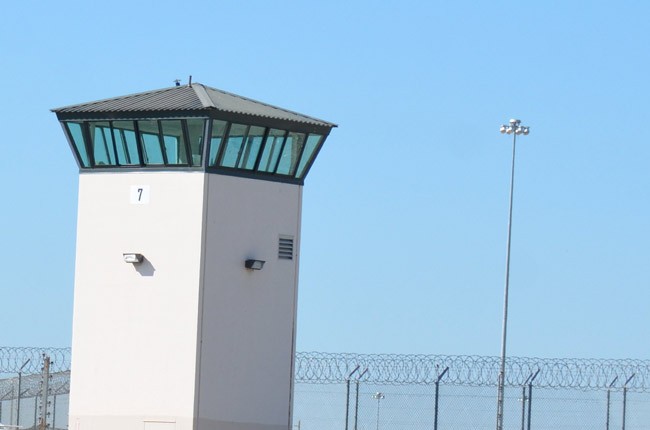
Advocates for changes in the criminal-justice system are taking their case to Florida, the fifth state on a “Fair Sentencing and Fair Chances” tour aimed at reducing the number of prisoners across the country.
The bipartisan Coalition for Public Safety, which is backing the tour, says the United States has less than 5 percent of the world’s population, but nearly a quarter of its prisoners. American taxpayers spend $80 billion each year to keep 2.3 million people behind bars.
Florida, which has more than 100,000 prison inmates, spent $2.2 billion on its corrections system in 2014. The “Fair Sentencing” tour also has been to Texas, Illinois, Arkansas and Minnesota, as it argues that states are jailing too many people.
“Crime prevention is not a binary choice between incarceration and nothing,” said Brian Elderbroom of the Washington, D.C.-based Urban Institute. “There’s a lot we can do to prevent crime that doesn’t involve locking people up.”
Elderbroom took part Thursday night in a “Fair Sentencing” event at the Florida State University College of Law. Other panelists included state Rep. Jose Javier Rodriquez, D-Miami, former Florida Attorney General Bob Butterworth, former Attorney General Richard Doran, Walton County Sheriff Michael Adkinson, Jr., and Lauren Galik, author of a 2015 report called “The High Cost of Incarceration in Florida: Recommendations for Reform.”
Their consensus was that Florida’s get-tough-on-crime laws of the 1990s — such as 10-20-Life, mandatory minimum sentences for drug offenses and habitual-offender laws — should be reconsidered and perhaps changed, as other states have done.
“Let’s tell these legislators, ‘You don’t have to worry about being soft on crime, because you’re not,’ ” Butterworth said. “If we can deal with mental-health issues, if we can deal with drugs and alcoholism, we can turn all of our prisons and jails into schools.”
Such views fly in the face of arguments that Florida’s crime rate — now at a 44-year low — is proof of the success of the state’s hardline approach.
But panelists noted that crime is down across the country. Florida, meanwhile, continues to spend money incarcerating people who are not threats to public safety.
“I don’t know what’s taking Florida so long,” said former Monroe County sheriff Allison DeFoor, now an official of the Episcopal Diocese of Florida. “It’s unimaginable to me that Mississippi and Georgia and Alabama would get ahead of us in public policy.”
DeFoor, a longtime Republican activist, has long been involved in what is known as the “smart justice” movement, which includes such things as diversion programs for non-violent offenders.
The Coalition for Public Safety includes an array of groups, including the American Civil Liberties Union, Americans for Tax Reform, the NAACP, the Faith and Freedom Coalition and the Center for American Progress. Its financial backers include the Ford Foundation, the MacArthur Foundation and Koch Industries.
Still, influential Floridians of both parties have been pushing changes for years, with little to show for it.
Adkinson — whose remarks focused on the relationship between addiction and incarceration — said the “smart justice” advocates needed time to establish the facts of their case.
“The good, deep research that needed to be done to back it up is just now coming forward,” he said. “There was a time and a place to do everything we did in the past. … Now there’s a time and a place to re-examine — and we should be doing that.”
However, Adkinson and Rodriguez said most elected officials feared appearing to be “soft on crime.”
“Especially on the Democratic side of the aisle, there’s less courage,” Rodriguez said.
“It’s the Dukakis effect,” Adkinson replied, evoking the image of former Massachusetts Gov. Michael Dikakis, the 1988 Democratic presidential nominee who got hammered by Republicans in ads about felon Willie Horton.
–Margie Menzel, News Service of Florida





























YankeeExPat says
“In Florida, for-profit prison interests have spent close to $1.5 million towards buying Rick Scott’s support in the 2014 elections. Earlier this year, Scott attended a fundraiser at the home of the CEO of the GEO Group, the second-largest private prison company in the world. Rick Scott’s “Let’s Get to Work Committee” has received at least $365,000 from GEO and related companies alone.”
..David Fernandez FIGHT FOR FLORIDA 10/01/14
fightforflorida.com/2014/10/01/rick-scott-prison-profiteer/
scoff the cuff says
The U.S. has the greater number of prisoners? Maybe the world lives among more criminals.
There is no help for addiction in jail, being jailed for being hooked is harm.
If it is a matter of jail population reduction, export the non-citizens. It is a start.
mel guillory says
Lock em up and throw away the key, you will agree when the kill a family member of yours!
theevoice says
the only reason 10/20/life doesnt work is because it is so seldom enforced..jail should be long and unpleasant..